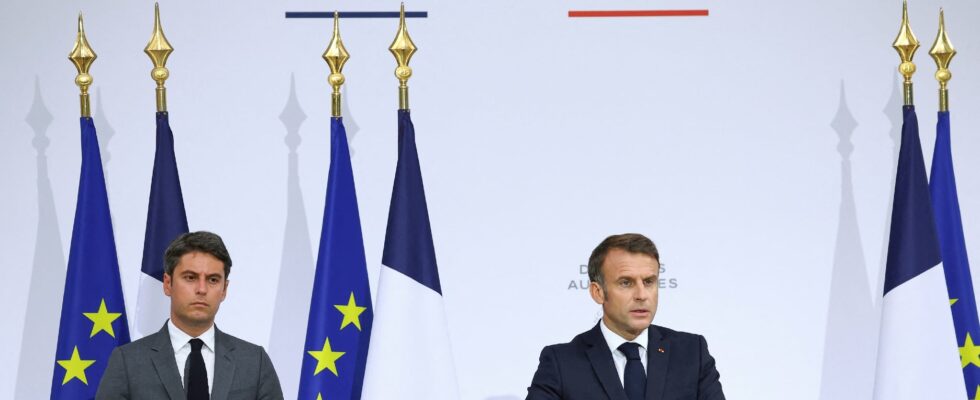The political and institutional configuration left little room for doubt. The President of the Republic will accept, by Tuesday evening, July 16, the resignation of his Prime Minister, Gabriel Attal, after having refused it for the first time the day after the second round of the legislative elections. Having remained in full force despite the defeat of the presidential camp on July 7, the government will now be “resigned”.
As soon as the decree terminating his functions is signed by Emmanuel Macron, he will become a “government in current affairs”, according to the legal nomenclature. Thus, until the appointment of a new government team, the executive will limit itself to ensuring the continuity of governmental and administrative action. That is to say, accomplishing what is strictly necessary to ensure the continuity of the State. And this, for “a few weeks”, probably until the end of the Olympic Games at least, participants in the Council of Ministers told AFP on Tuesday.
Reduced powers
In addition to having to avoid inter-ministerial meetings at the risk of “increasing unnecessary work”, the Prime Minister and his team will not be able to launch any structural measures. “The government is no longer in a position to make a political decision or to submit a bill”, explains Anne Levade, professor of public law at the Panthéon-Sorbonne University. It can nevertheless take up “urgent matters”, the adoption of which is conditioned by “an imperative necessity”. Constitutionalist Benjamin Morel recently listed in L’Express a series of situations that could lead the government to take exceptional measures: “natural disaster, major disturbance of public order, loss of control of all or part of the territory, etc.”
Furthermore, any regulatory measure can only be taken “by exception”, in the name of the continuity of the State, or when it is urgent. And if the President of the Republic can convene a council of ministers, its agenda must not be too loaded. He will also not be able to make “appointments deemed politically sensitive or sign a politically sensitive decree”, indicates Anne Levade. For example: the decrees desired by the executive on the reform of unemployment insurance would not a priori fall within the scope of current affairs.
This is in any case what a case law of the Council of State suggests, which serves as the only precedent in this matter. In 1952, the judges of the Palais Royal had annulled an implementing decree issued by a provisional government on the grounds that it could not be regarded as a current matter. Although it dates back 70 years, “this decision was considered serious enough that the case would never arise again”, notes Anne Levade.
A configuration that is anything but abnormal
If the powers of a government in office are restricted, it is in particular because, having resigned, it is no longer responsible to Parliament. “In a parliamentary regime such as that of the Fifth Republic, logic dictates that a government should use political power because it is likely to see its responsibility engaged before the National Assembly. This is therefore not the case for a government that has already resigned,” specifies Anne Levade.
This political configuration, relatively unknown, is not exceptional. Each time there is a change of Prime Minister, the government in place is systematically “in current affairs” while waiting for a successor to be appointed to Matignon, and for the latter to form a new team. It is therefore only a phase of “transition that must not drag on”, underlines Guillaume Drago, French professor of public law at the Panthéon-Assas University Paris II.
Under the Fifth Republic, the longest-lived resigning government – 5 days – was that of Bernard Cazeneuve, who presented his resignation on May 10, 2017, and whose government remained in day-to-day business until Emmanuel Macron appointed Edouard Philippe on May 15. It will once again be up to the latter to appoint the future tenant of Matignon. But for the first time in seven years, it should be imposed on him.
